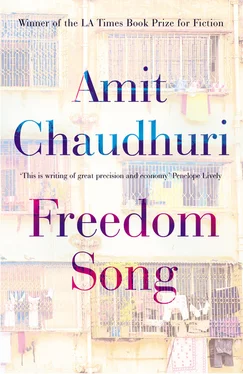On the first floor of the house, on the double bed where Piyu and her mother were now sleeping, a grandmother had lived twenty years ago. She was Bhaskar’s father’s mother; of her seven children, Khuku was her favourite, but she was in those days in Bombay with her husband and a son of her own. From time to time, the grandmother’s children, who were scattered with their families in different parts of India, would visit this house to see their mother, who was eccentric and did not have much to say to them any more; she had brought them up and now her duties, she had decided, were over. Bhaskar’s father, Bhola, and Khuku, who was only a year older than him, often called their mother ‘Goonga’. The bed on which Piyu and her mother were now sleeping was her bed, her divan, her arm-chair, her footstool. In the morning her quilt and pillows were banked on one side of the bed, the bed beaten with a jhata by Durga, and then draped with a bed-cover. She, wearing her white sari, for her husband had died thirty years ago, sat peering at the Amrita Bazaar Patrika through her reading glasses, beginning at the first paragraph on the first page and ending at the last. No one dared bother her but the children, among whom she was only openly affectionate towards Piyu, who could still barely walk, and was regarded by everyone, including six-year-old Bhaskar, as a discovery, a curiosity, and especially amusing in the way she imitated certain grown-up gestures. The grandmother’s lunch was laid out on a table before the bed by Nando, who worked then in this house, and looked much the same in his white shirt and pyjamas, his hair oiled, and his face demon-like. ‘Ei Nando,’ she would shout, ‘Bring the salt and the oil!’ and Nando would rush back with salt on a plate and a bowl of mustard oil. She had died a few years later. The pomelo tree by her window, whose fruit she ate with mustard oil, secretly adding sugar, had blossomed again this winter, its fruit picked and stolen by a new generation of urchins and scallywags who looked exactly like the ones who had climbed the tree twenty years ago. Some of her children, in those twenty years, had grown old and died as well, leaving Khuku, Bhola, and two more brothers, including the eldest, who, though hunched now, and forgetful of names, still found time to get angry about umpires’ decisions in cricket matches.
It was an old house, a hospitable house. In the big room on the second floor, which Bhaskar now had more or less to himself, and where he engaged in animated discussions or restful gossip with comrades from the Party, shy men with moustaches whose frail chests suddenly expanded during these discussions — on the large bed in this room Bhaskar and his brother Manik, who was now in Germany, used to sleep once. When Khuku’s son, Bablu, came down for the summer, Khuku’s elder sister would also have arrived from the hills of Assam where, in a town with a funny name that sounded like a kitchen utensil, she was headmistress in a girls’ school. Reading everything from Beowulf to Puja annuals at the oddest of angles — for she would lie sideways and let the magazine dangle from the fingers of one outstretched hand, moving grudgingly only when it dawned on her that it was impossible to turn the page without the aid of the hand that was trapped beneath her — reading everything at such angles had given her eye a squint, and her an incongruous lost and searching look. Incongruous, for, despite being widowed when she was thirty-four, she had raised her children robustly, feeding them well and twisting their ears. During those summers, on the bed on the second floor, she told Bablu and Bhaskar and Manik stories about ancient Rome, and the last days of Pompeii. At present, the bed upstairs was empty, with winter sunlight falling upon it, obstructed only by the mullions in the windows, and Bhaskar was away at the factory in Howrah — but once he had lain there on his stomach with a new book before him and seen rakkhoshes with fangs and nose-rings drink the blood of innocent kings, rakkhoshes who married female rakkhoshes and produced hordes of fearful little khokkhoshes with small fangs and round eyes. Durga had told Bhaskar and Manik when to be careful of ghosts — between two and three o’clock in the afternoon, when grown-ups slept or were away at work and even real objects threw no shadows, and, at night, during the pregnant hours that preceded dusk. If they sensed anything unearthly, Bhaskar and Manik promptly muttered to themselves the lines they knew by heart:
Ghoul’s my daughter,
Ghost’s my son.
Ram’s in my heart,
And no harm can be done.
The children came to the house like guests; their parents and Durga were already there when they arrived. They welcomed them and took them out of their first wondering, semi-conscious state. Once, when Bhaskar was seven and Manik five, they saw from their bed at three or four in the morning a woman who was not Durga or their mother hanging clothes to dry in the bathroom; then they fell asleep again. It was an old house; a family had lived in it before their parents had moved in, and Bhaskar was certain that a woman in that family had died. He hinted, but never admitted, that the woman he and Manik had seen was the same woman.
This house had been a wedding gift from Bhola’s father-in-law, part of a dowry. Since then it had gone through changes, for the worse and then for the better, but its red stone floors and stairs and its bottle-green windows with slats and the small prayer-room upstairs had remained the same. The kitchen had been painted; new shelves had been fitted; and the earthen oven, dust-coloured, hollow, into whose sides Durga pushed wood and coal, had been put in the shed at the back of the house where coal and wood used to be kept. Durga herself had returned to her village.
At four o’clock Bhaskar’s mother woke as surely as if an alarm clock had gone off inside her. Her eyes, in a face puffed with sleep, opened, red and unfocused. For fifteen years she would get up thus at half-past six in the morning and, with her eyes still small and red, walk towards the bed where Manik and Bhaskar were sleeping and push them by their shoulders, for they always slept on their sides, curled up, one side of their face sunk in the pillow, so that, waking up, their cheeks would be lined with pillow marks. Manik had always been shorter and fairer than Bhaskar, until, when he was fourteen, he shot up and they were both the same height, though Manik, much thinner, sometimes looked taller. And Manik, wandering joyously with his friends in the sun, grew darker, till he was brown as a roasted nut. In the morning, their mother would shake their rather bony frames (Look at them, she would think in disgust, not a bit of flesh on them, just like urchins) and say in a loud whisper, ‘Ei, Manik! Ei, Bhaskar! Get up! Get up!’ while they clutched their pillows tightly and grew more and more angry in their sleep. When they had any spare time, these two were always arguing and fighting, till, each wrestling titanically with the other, they fell rolling upon the bed. They were separated and brought to their senses by two sharp slaps and smart tugs of the hair administered by their mother. ‘You idiots! Look at yourselves! Why don’t you fight on the streets? — That’s where you should be!’ Then she would turn to Bhaskar. ‘And you. . I know very well you’re the one who starts it. . this other one’s an idiot, but you. . you’re a mischievous devil!’ ‘What did I do?’ Bhaskar would wail, wiping his eyes and about to cry. ‘And look at your face. . Every day it’s getting longer, till it’s begun to look like a slipper! You don’t eat anything, you don’t do any work, all you can do is tease this fool!’ These days the house was quieter. School had been one of the most difficult of times for everyone, getting up in the morning, coming back in the evening and doing the homework, buying a new white uniform every year, the white shorts being replaced by trousers, Bhaskar, Manik, and Piyu swigging down glasses of Haringhata milk each morning as quickly as if it was medicine, lifting their faces from their glasses with uneven white moustaches around their lips, how their mother suffered for them, what tension, sewing buttons and pushing them towards the school bus on time, the rice still unfinished on their plates—‘Tell him to wait!’ Piyu would shout, rinsing her mouth at the basin, ‘Tell him to wait!’—while the bus engine rumbled sullenly in the lane; she — their mother — had gone nearly mad coping with it. Yet now the house was silent, lives took shape, things changed, and widened, unused spaces wandered about the house, Manik had gone to Germany, and it seemed there had been a certain innocence and neglect about that time. She wanted to witness it again, she wanted Bhaskar to marry now and have children and that whole maddening bustle to resume.
Читать дальше












